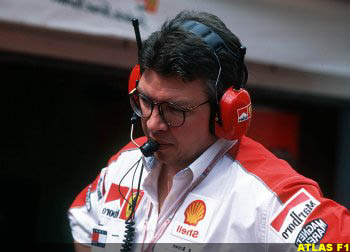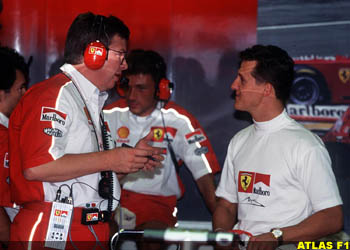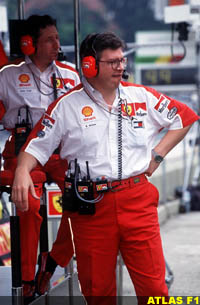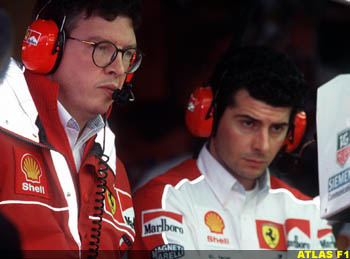Niki Lauda said Ferrari should dwell on a serious "where did we go wrong" soul-searching. Ross Brawn, however, doesn't think they need to
 The 1998 Grand Prix season was typically tough and closely-fought - but few would have believed this that would be the eventual outcome at the beginning of the year. After all, McLaren dominated the start of the season, winning five out of the first six races. But then Ferrari began to fight back, with Michael Schumacher taking a hat-trick of wins, before McLaren reasserted themselves. After a brilliant race from Schumacher in Hungary, a Ferrari one-two at Monza, and then a brilliant victory by Mika Hakkinen at Nurburgring, there was everything to play for as the teams went into the final round at Suzuka. The result, of course, is recent history, but after the disappointment of just missing out on the championship at the final race, how does Ferrariís technical director, Ross Brawn, feel about the 1998 season? The 1998 Grand Prix season was typically tough and closely-fought - but few would have believed this that would be the eventual outcome at the beginning of the year. After all, McLaren dominated the start of the season, winning five out of the first six races. But then Ferrari began to fight back, with Michael Schumacher taking a hat-trick of wins, before McLaren reasserted themselves. After a brilliant race from Schumacher in Hungary, a Ferrari one-two at Monza, and then a brilliant victory by Mika Hakkinen at Nurburgring, there was everything to play for as the teams went into the final round at Suzuka. The result, of course, is recent history, but after the disappointment of just missing out on the championship at the final race, how does Ferrariís technical director, Ross Brawn, feel about the 1998 season?
"Weíre fairly proud of becoming competitive with McLaren - fully competitive, I guess, for the last third of the season and able to beat them when they werenít doing such a good job in the middle of the season," says Brawn. "So to finish the year with both championships being decided at the last race was a testament to Ferrari. The only regrets are that we couldnít have been more competitive sooner because with the work that we did this year, and with the reliability that we had, if weíd been competitive for the first four or five races, we would have won the championship before Suzuka.
 "Thatís the only regret I have about the season, technically, and there were reasons for it. Goodyear didnít fully understand what was needed from the tyres until the season had begun; and we had a new group at Fiorano designing the car and there were still some things we had to iron out on the car at the beginning of the season. I think one of the difficulties that Goodyear had over the winter was deciding whose input to use. Williams made a narrow track version of their 1997 car and we said to Goodyear that we didnít think that that was going to be as representative of the new generation of cars as running an old car would have been. "Thatís the only regret I have about the season, technically, and there were reasons for it. Goodyear didnít fully understand what was needed from the tyres until the season had begun; and we had a new group at Fiorano designing the car and there were still some things we had to iron out on the car at the beginning of the season. I think one of the difficulties that Goodyear had over the winter was deciding whose input to use. Williams made a narrow track version of their 1997 car and we said to Goodyear that we didnít think that that was going to be as representative of the new generation of cars as running an old car would have been.
"So we ran our 1997 car with no modifications, because everything was telling us that our 1998 car would be as good if not even better, despite the regulation changes. Williams produced their hybrid, so that Goodyear had a lot of confusing information over the winter and of course, that information came from two top teams. It was a little difficult for them. But I think that as soon as the new generation of Formula One cars started to run, they saw almost straightaway that perhaps the things that weíd been pushing for were nearer the mark and they very quickly changed direction in terms of what they were doing and by Argentina, we had the first of a new generation of tyres.
 "Goodyear made two big changes. One was the wider front which was very important and the second was the new family of compounds. That meant that instead of dreading a hot race, we almost welcomed a hot race by the end because the Goodyear compounds just kept working better and better whereas last year we were petrified it was going to get hot for a race because the Goodyear compound couldnít stand up to it. So they produced a new family of compounds which were very very good and they produced this wide front which was very good. On top of that, they made smaller advances in construction and the shape of the tyres and various other things, which were small steps. But to my mind the two big steps were why the tyresí performance improved so much." "Goodyear made two big changes. One was the wider front which was very important and the second was the new family of compounds. That meant that instead of dreading a hot race, we almost welcomed a hot race by the end because the Goodyear compounds just kept working better and better whereas last year we were petrified it was going to get hot for a race because the Goodyear compound couldnít stand up to it. So they produced a new family of compounds which were very very good and they produced this wide front which was very good. On top of that, they made smaller advances in construction and the shape of the tyres and various other things, which were small steps. But to my mind the two big steps were why the tyresí performance improved so much."
So did Brawn think that his new car was right from the start? "Yes. I think the only hiccough was Hockenheim where we did something technically which was a bit of a screw-up and we had a few other things go wrong that weekend which meant that we missed the problem. Thatís probably the only race this year where Iíd say we didnít do a good job. We scored a few points, which proved to be crucial, but we werenít competitive. Apart from the first few races of the year, itís the only race where I didnít feel we had the likelihood of winning the race."
Does he think the car was pretty much on a par, technically, with the McLaren? "By the end of the season, yes. Its development was really just a process of evolution. The car was pretty good to begin with. The drivers were complimentary about the car, it was stable, it had good balance, they could drive it well. So development was really down to normal things: trying to reduce drag, trying to improve the downforce, working on damping, working on chassis settings, things like that.
 "Early on, we modified the exhaust, which was really a solution to a unique problem that we had. This particular engine needs a very short tail pipe and we thought we had a solution, which looked OK at Fiorano but when we came to run at tracks like Mugello and Jerez with long straights and more heat generation, it caused a problem with the rear suspension and the back of the car which were getting too hot. "Early on, we modified the exhaust, which was really a solution to a unique problem that we had. This particular engine needs a very short tail pipe and we thought we had a solution, which looked OK at Fiorano but when we came to run at tracks like Mugello and Jerez with long straights and more heat generation, it caused a problem with the rear suspension and the back of the car which were getting too hot.
"So as a short term fix we put the exhaust through the floor which we know from experience can cause less consistency in the car; the on-off throttle effect is greater with the exhaust through the floor. That wasnít the ideal solution so we then came up with the version which came out of the top of the bodywork, which has its disadvantages but basically was the best compromise that we could achieve with what we had. That was one of the most noticeable changes to the car but it wasnít a huge performance improvement per se, it was solving a problem. From a performance point of view, it was no better than the first exhaust that we had, just that we couldnít run reliably with the first exhaust."
Brawn is hardly resting nowadays, with work towards the 1999 season already underway at Fiorano. "I Never give up," explains Brawn, "thatís always been a motto and it proved right again this year. Once again, I think Ferrari proved how resourceful they are. Ferrari have tremendous resources: people and manufacturing capacity and now design capacity, so itís a very strong team. There was never ever any hesitation in asking for things we needed to be competitive. Thereís a very good group of people there who know what it takes and theyíve now got the added confidence of knowing that they can win a championship and they can win races, so even if it didnít come off this year, we were close enough to do it and to the inner confidence, it tells people that they can do it. So once again Ferrariís resource was confirmed to me. I guess I didnít learn that just this year, but I had it confirmed."
|